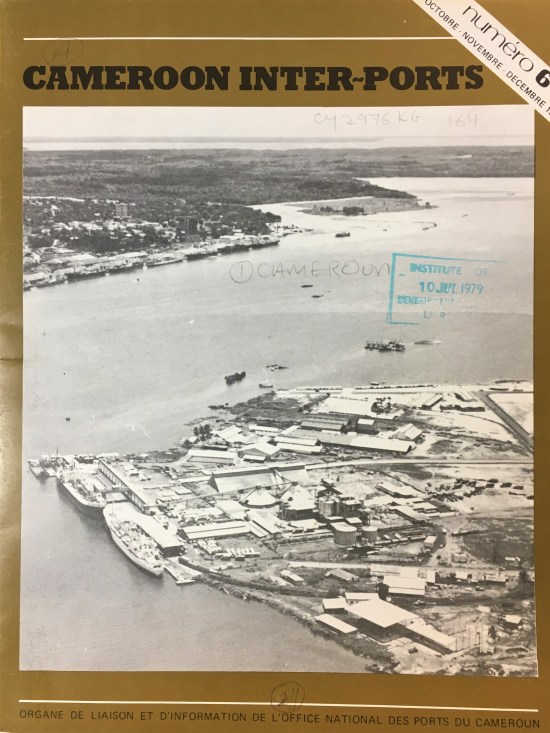By Danny Millum – BLDS Metadata and discovery officer
There are many fascinating rabbit holes to explore in the BLDS Legacy Collection, and you often come across them in the most unexpected places. Perhaps this just shows our limited imagination, but when we first came across a run of journals relating to different African ports and harbour authorities our hearts didn’t leap with excitement. File under “worthy but dull” and move on was definitely the first reaction to a front cover like this:

And let’s face it, if you were asked what you thought lay within the pages of Cameroon Inter-Ports – Organe du Liaison et d’Information de l’Office National des Ports du Cameroun you would have been forgiven for thinking it would just be; tables, charts, reports and the odd institutional history. However, in order to catalogue these items we have to have a leaf through them, and when we did so we found a much richer and more idiosyncratic world than we could possibly have expected.
To start with, there was a sports section. The page below reports on a triumphant season for the Port Foot-Ball Club in 1981-82, winning the cup and coming second in the coastal league:

They obviously took it seriously as well, as half the page seems to be taken up with references to how mediocre the team had been in the past, with the hope that this change in fortune augured well for 1982-83. (Please note this assessment is dependent on our extremely shaky French and corrections are welcome!) For those who want to find out how it all panned out next season we believe we have a complete run of the magazine! More surreal than this is the humour and poetry section:

Again, this is mostly in French, but the first gag runs something as follows:
A freighter lands for the first time in a desert island far away from the usual sea routes. The captain disembarks to do a reconnaissance. He comes upon an old man with a beard down to his knees…
‘What are you doing here?’
‘I don’t know…’
‘Why did you come to this island?’
‘To forget?’
‘To forget what?’
‘I’ve forgotten.’
It kind of feels like something may have been lost in translation here – although on the same page the poem in English about tyres is if anything, more confusing…
It soon became clear, though, that journals and content of this kind are not limited to Cameroon, and that Somalia and Tanzania could give the West Africans a run for their money.

The BLDS Legacy Collection also holds what appears to be a unique run of Bandari Zetu – Organ of the East African Harbours Corporation, a journal in Swahili and English which contains a potent mix of port news sprinkled with more creative content, including this fantastic Aesopean tale, the morals of which the BLDS team have taken as a code to live by:

The East African Harbours Corporation seems to have been part of the East African Railways and Harbours Corporation – which itself turns out to have been immortalised in song by the great Roger Whittaker. Check out ‘The Good Old E A R and H’ here – https://www.youtube.com/watch?v=Qwmb6WtyEUQ.
Obviously, we’re trapped at home at the moment, and so the only follow-up research I could do for this post is online. But the very fact that there is so little information on the web relating to the institutions, and journals described above is in itself further evidence of the importance of the collection. The long runs of port authority journals that are held for both West and East Africa are crucial primary sources for anyone wanting to write, not just the ‘serious’ history of transport, trade and commerce in these regions in the post-independence decades but also, possibly even more importantly, they are goldmines of ephemeral information relating to the culture of these workplaces and the people employed there.
It’s an obvious point, but as the examples above show, these dockworkers, engineers and sailors were not just employees, but also poets, comedians and footballers.
(First posted on The University of Sussex Library staff blog April 2020)


Leave a Reply